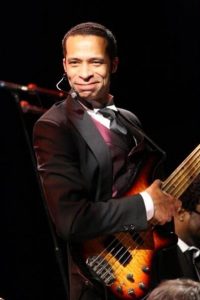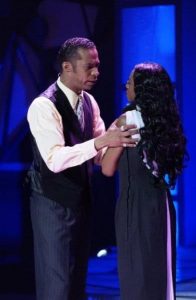
Bill Myers – Courtesy of Lori Markum. Used with permission.
Multi-talented artist Bill Myers, like so many of us, is using his time in quarantine to tie up loose ends. In doing so, the 54-year-old Indianapolis native finally put to rest a troubling slight that had haunted him for decades. An accomplished actor, musician, writer, director, producer, filmmaker, and arts educator, Myers and I have been friends and colleagues for years; both of us are talent for Helen Wells Agency. My other association with Myers is through his 81-year-old father Bill, a retired 54-year Indianapolis Metro Police officer, who is also signed with HWA and with whom I have worked on various shoots. Some time ago, I asked Myers for an interview, but it wasn’t until a few weeks ago that he followed up. Last week, we spoke by phone from his home where he is quarantined with his 83-year-old mom Georgia, who suffers from Alzheimer’s, and for whom he is a caregiver. It was during our chat that Myers shared news regarding the unfinished business and a major career opportunity that has come his way.

Bill Myers – Courtesy of Scot McKim. Used with permission.
In 1987, three years after graduating from Broad Ripple High School, Myers was living in New York City, where he worked as an actor on the ABC soap opera “Loving” in the role of Dave Hindman, which he originated. While on summer hiatus, he traveled to Chicago to appear in a docudrama produced by the NBC-owned-and-operated station WMAQ titled “Fast Break to Glory,” which focused on the legendary 1954 DuSable High School basketball team, the first all-Black team that made it to state finals. When the project wrapped, Myers returned to NYC and his routine and thought nothing more of it.
The following year, Myers received a message from an uncle in Chicago congratulating him for winning an Emmy for his role in “Fast Break.” Not having received any notification of the award, much less an invitation to the ceremony, Myers, who said he was dealing with insecurities and feeling vulnerable at the time, was completely flummoxed by the oversight. He said he didn’t make any inquiries because he was busy and also felt hurt that neither the “Fast Break” producers, nor the Academy made any effort to contact him about the nomination, much less the award. Myers said he also had reservations about the award itself. “I had an overriding fear of how Blacks receiving awards at the time were affected adversely. Their opportunities seemed to dry up and they were no longer considered for top projects. There was a very different industry reaction for whites who received awards. There was usually an addition of an extra zero to their earning value and the industry pushed to move them into A-list projects,” explained Myers. As a biracial (his father is Black and mother is white) artist, he was especially sensitive to these inequities.
Myers said being in quarantine caused him to do some deep reflection and soul searching. One of the issues he needed to resolve was the conflict surrounding the missing Emmy Award. Eventually, he did a Google search and found the Emmy nomination form containing his name and a promotional photo. So, along with his headshot, he emailed screenshots of this evidence to the Chicago/Midwest Chapter of National Academy of Television Arts & Sciences (NATAS), along with a note explaining the situation. The next day, he received an apologetic response, promising the omission would be rectified, along with a request for a copy of his driver’s license. He received the award, sent by FedEx, on March 20 and was able to open the box in front of his mom and share the moment with her. “There was no invitation. No fanfare. No champagne. But being able to share it with my mom that way was one of the greatest moments of my life,” said Myers.
Myers’s journey as an artist was not a straight trajectory. He admits it took him a while to even acknowledge he was one. That did not happen until he was commissioned by the Indianapolis Museum of Art to produce a musical piece in 2009 for Martin Luther King Day titled “Music, Martin & Me.” That’s when he said he found his voice. “It was a very daunting task. I realized I had always been telling other people’s stories. I was always the pitch guy for others, but that was when I found my voice, doing that project. It was an amazing thing. It scared the hell out of me because it was me speaking about MLK, my favorite American figure. I did not solicit the project. It came from out of the blue,” said Myers, getting emotional as he talked about the experience.

Bill Myers in “Dreamgirls” – Courtesy of Scot McKim. Used with permission.
“I believe an artist is vulnerable, intentional, compassionate, purposeful, disciplined and a skilled craftsman, who is aware, sacrificing the comfort and convenience of a ‘normal life’ to follow their inner path and calling with great courage and endurance. An artist is willing to risk it all to make a meaningful contribution to the world through their own unique talents, gifts, perspective, vision and voice,” Myers answered when I asked him what he has discovered since owning his raison dêtre.
Later in his life, Myers became president of the Indianapolis Downtown Optimist Club and found himself speaking all over the country. Beginning the next chapter of his career as a public speaker, Myers decided that one day he would move into the broadcast realm. After researching podcasts, he connected with some collaborators who could make it happen. That time has come. And that is the other big news Myers is excited to share. On Thursday, July 17, at 3:00 p.m., he will debut his own talk show and podcast, “Bill Myers Inspires” on the Inspired Choices Network. The podcast can be accessed on 54 outlets, including Apple Podcast. Deeply committed to social justice, Myers said he plans to talk about “meaningful things” with both local and nationally known figures.
As we winded down our conversation, I asked Myers what the pandemic has taught him. “It has shown me how absolutely everything I was doing was so completely dependent on the gathering of groups of people. From music performances to theatre collaborations, TV commercial work, film/video productions, and corporate special events, etc…It has shown me that I was so preoccupied by what I was doing that I actually had become distracted from pursuing other things that were piling up on my to-do list for many years,” he said.
Insisting the pandemic has been “a blessing in disguise,” Myers added it was “the necessary pause I needed to take a breath, regroup, and refocus my energies on what I must do to reposition myself in this next chapter of my life and put the wheels in motion. As far as any immediate results, he said, “These much-needed, professional adjustments are already yielding greater contentment and inner peace, allowing greater financial possibilities, which improve the quality of care I can provide for my elderly mother. This is hugely important and indeed a blessing.”
Wrapping up the interview, I asked Myers what he misses the most. “I miss the hugs. Just as ‘absence makes the heart grow fonder,’ I look forward to and yearn for that time, soon, when we can once again engage in the warmth of an embrace, with more meaning and love than ever before,” he said, adding his hope for the post-pandemic future is for “those of us who manage to weather this storm to emerge with new awareness and a renewed understanding and appreciation for each other and the awesomeness of being alive, which we had previously taken for granted.”
For more information about Bill Myers and his podcast, “Bill Myers Inspires,” go to billmyersinspires.com.





